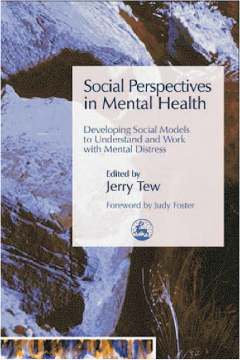
BOOK
Social Perspectives in Mental Health
Jerry Tew | Sarah Carr | Peter Beresford | Martin Webber
(2004)
Additional Information
Book Details
Abstract
Social Perspectives in Mental Health offers new practice frameworks that help to make sense of people's mental distress and recovery in relation to their social experience. This interdisciplinary volume promotes a holistic approach to mental health practice, with an emphasis on recovery and empowerment, and on building on the experiences of service users. The contributors explore the impact of social factors, such as power, abuse, ethnicity, gender and sexual orientation, on the causes and experiences of mental health problems. It is also considered how concepts such as risk and recovery can be understood from a social perspective.
Drawing on expertise from a wide range of academic, policy and practice settings as well as lived experience, this book is essential reading for practitioners, students and educators in the fields of mental health and social work.
A brilliantly succinct and readable summary that brings together models and evidence from sociology, psychology, social psychiatry, service user networks and the disability and minority rights movements into a coherent whole. I guarantee you's be hooked.
Clinical Psychology Forum 186
Table of Contents
| Section Title | Page | Action | Price |
|---|---|---|---|
| Prelims [ Inter-Church Organization for Development | Cooperation Statement | Acknowledgements | Series Editors’ Foreword | Author’s Preface | |||
| 1 Livelihoods Perspectives: A Brief History | |||
| Livelihoods Thinking | |||
| Sustainable Rural Livelihoods | |||
| Keywords | |||
| Core Questions | |||
| 2 Livelihoods, Poverty and Wellbeing | |||
| Livelihood Outcomes: Conceptual Foundations | |||
| Measuring Livelihood Outcomes | |||
| Evaluating Inequality | |||
| Multidimensional Metrics and Indices | |||
| Whose Indicators Count? Participatory and Ethnographic Approaches | |||
| Poverty Dynamics and Livelihood Change | |||
| Rights, Empowerment and Inequality | |||
| Conclusion | |||
| 3 Livelihoods Frameworks and Beyond | |||
| Livelihood Contexts and Strategies | |||
| Livelihood Assets, Resources and Capitals | |||
| Livelihood Change | |||
| Politics and Power | |||
| What’s in a Framework? | |||
| Conclusion | |||
| 4 Access and Control: Institutions, Organizations and Policy Processes | |||
| Institutions and Organizations | |||
| Understanding Access and Exclusion | |||
| Institutions, Practice and Agency | |||
| Difference, Recognition and Voice | |||
| Policy Processes | |||
| Unpacking the Black Box | |||
| 5 Livelihoods, the Environment and Sustainability | |||
| People and the Environment: A Dynamic Relationship | |||
| Resource Scarcity: Beyond Malthus | |||
| Non-Equilibrium Ecologies | |||
| Sustainability as Adaptive Practice | |||
| Livelihoods and Lifestyles | |||
| A Political Ecology of Sustainability | |||
| Sustainability Reframed: Politics and Negotiation | |||
| 6 Livelihoods and Political Economy | |||
| Unity of the Diverse | |||
| Class, Livelihoods and Agrarian Dynamics | |||
| States, Markets and Citizens | |||
| Conclusion | |||
| 7 Asking the Right Questions: An Extended Livelihoods Approach | |||
| Political Economy and Rural Livelihood Analysis: Six Cases | |||
| Emerging Themes | |||
| Conclusion | |||
| 8 Methods for Livelihoods Analysis | |||
| Mixed Methods: Beyond Disciplinary Silos | |||
| Operational Approaches to Livelihoods Assessment | |||
| Towards a Political Economy Analysis of Livelihoods | |||
| Challenging Biases | |||
| Conclusion | |||
| 9 Bringing Politics Back In: New Challenges for Livelihoods Perspectives | |||
| Politics of Interests | |||
| Politics of Individuals | |||
| Politics of Knowledge | |||
| Politics of Ecology | |||
| A New Politics of Livelihoods | |||
| Back Matter [References | Index] |
